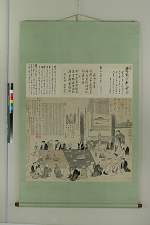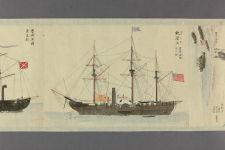Yōgaku · Rangaku
(Western Studies, Dutch Studies) Collection
During the Edo period, when the Shogunate's policy of national isolation had severed most contacts with the outside world, dealings with the Dutch via their trading post on the island of Dejima in Nagasaki enabled a trickle of foreign culture to enter Japan. The field of Dutch Studies, also known as Western Studies, was pioneered by the official interpreters of Nagasaki (Orandago tsūji), as well as doctors such as Sugita Genpaku (1733-1817) and Ōtsuki Gentaku (1757-1827). From the eighteenth century through the late nineteenth century, Dutch Studies provided the foundations of both Japan's internationalization and its modernization. The fourth Director of the Waseda University Library, Okamura Chibiki (1882-1964), made a point of collecting primary sources related to Dutch Studies. Those that he amassed include materials passed down in the Ōtsuki house (one of which is designated an Important Cultural Property) as well as many other important documents, which together form one of the best collections of such sources in Japan.




